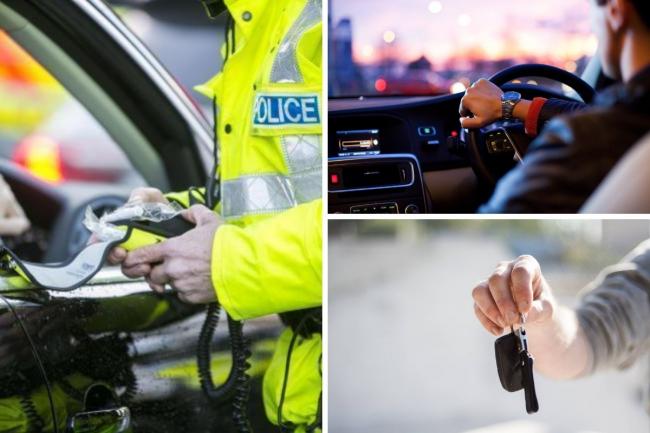
In 2020, close to 101,000 motorists were caught driving without insurance, up from 87,000
- Over the last two years, drivers have collectively paid out a whopping £11.7 million to release their car after being seized by police forces(1).
- More than 56,000 cars were destroyed by police forces in 2019 and 2020, with a further 9,000 being auctioned, raising more than £6.2 million.
- Further research finds a third (33%) of UK drivers have borrowed or driven another car without necessarily having the right insurance in place.
- Can I drive someone else’s car on my insurance? Confused.com clears up confusion as one in seven (14%) drivers are unaware of the rules around driving other cars.
The number of uninsured drivers on UK roads has increased by 16%, new data finds, as police forces report more than 101,000 offences during last year alone.
That’s according to new Freedom of Information data obtained by Confused.com, which showed that the number of motorists caught driving without the correct insurance increased from 86,914 in 2019, to 100,983 in 2020. This means those caught could have collectively paid as much as £56 million in fines over the two years, based on the minimum penalty dished out to offenders being £300(2).
When a driver is caught without the right insurance, the police are within their rights to not only issue fines but also seize the car in question. Offenders would then need to show evidence of a valid car insurance policy to release the car and pay a fee. In 2020, a total of 102,387 cars were seized, up from 96,279 in the previous year. This could be from the number of cars seized after being stopped, or those found on the road without insurance. And collectively, a whopping £11.7 million was paid by drivers to release their car, which could have been on top of the fines they’ve already paid, proving to be a very costly mistake to make!
Cars that aren’t reclaimed could be destroyed. In fact, over the last two years, more than 56,000 cars were destroyed by police forces. Or alternatively, they could be sold off at an auction, which was the case for 9,445 of the cars seized in 2019 and 2020. This raised a very nice sum of £6.2 million, averaging at around £650 made per car.
Taking out car insurance is one of the first things drivers must do when they buy or lease a car. And as it stands, all insurance policies are set to automatically renew at the end of their terms so that a driver is never left without cover. So why are so many drivers being caught out?
Previous research by Confused.com shows that many people cancelled their car insurance throughout the coronavirus pandemic to save money, which could explain the increase in offences last year. However, new research has found that a worrying one in three (33%) UK drivers have borrowed or driven another car without necessarily having the right insurance. Of those drivers, more than half (52%) did so under the assumption that they would be covered, while close to one in six (16%) knew they didn’t have the right insurance in place. Almost two in three (64%) made the excuse that they were only making a short trip, while more than half (58%) took the gamble because the owner of the car was with them.
While it seems that many people are knowingly taking the risk by driving uninsured, the research also found that many drivers are confused about what their insurance policy allows them to do. Nearly one in six (16%) UK drivers find it confusing to know if their policy allows them to drive other cars, while one in seven (14%) don’t know the requirements. According to Confused.com’s experts, driving other cars (DOC) isn’t something that is automatically included on comprehensive policies, despite many believing that it is. In fact, not all insurers will offer it as an option. It’s simply there for emergencies, such as if a friend has had an accident and needs driving to the hospital. But to have DOC on their policy there are a few requirements drivers must meet, including:
- They must be aged 25 or over when the policy starts.
- Their own car insurance policy needs to be a fully comprehensive one.
- The other car must have insurance already.
- More information is available here.
Worryingly, many drivers are unaware of the rules around driving other cars. In fact, one in eight (12%) wrongly believe its true that you are automatically insured to drive another car if you have comprehensive policy at any age, while a further one in eight (13%) believe this to be the case if you have a comprehensive policy and are over the age of 25.
However, experts suggest that motorists can only drive another car if their policy explicitly specifies it, although this will only cover for third-party damage, or if they are a named driver on the owner’s policy, in which case they would be covered for the same level as the policy holder. This seems to be a popular option for the two in three (68%) drivers who drive or have access to another car. Almost half (49%) of these drivers are insured as a named driver, while almost two in five (39%) are insured on their own comprehensive policy.
However, it seems that drivers who have access to another car aren’t necessarily using it regularly. In fact, only one in four (25%) will use the second car at least once a week, while one in five (21%) claim to use it very rarely. But this isn’t surprising, given that more than a fifth (22%) claim they only have access to another car to reduce the insurance premium. In fact, Confused.com car insurance price index (Q2 2021) data does suggest that this can reduce prices for some drivers, with the average premium dropping by as much as £204 for having another person on the policy(3). However, for two in five (41%) drivers, they have the option of which car to use depending on the journey they make.
Despite so many motorists being insured to drive another car, a worrying one in two (54%) admit they would still jump behind the wheel of another car without insurance, with almost two in five (38%) claiming they would take the risk in an emergency. However, this is a point that many drivers raised throughout the research, with one in three (30%) believing that having DOC on an insurance policy is important for emergencies, while more than one in five (22%) thinking it should be standard on all comprehensive policies.
Either way, it’s important for drivers to understand that having a comprehensive policy doesn’t automatically entitle them to drive another vehicle, and that they could in fact be hit with a very hefty fine. And when it comes to buying or renewing a car insurance policy, having a conviction for driving without insurance is likely to increase your premium, with some insurers potentially not offering cover at all.
If a driver needs to use another car, Confused.com’s guide to driving other cars explains how to check if this is included within insurance policy, or search for alternatives to help motorists avoid fines.
Alex Kindred, car insurance expert at Confused.com, comments: “Driving without insurance is an offence that can be costly in fines but can also damage your record when it comes to applying for a new car insurance policy.
“Not only this, but you could risk having to pay to have your car released, which when you consider the fine as well, could end up costing you more than an insurance policy itself!
“Insurers appreciate that there are some emergency situations where you may need to jump behind the wheel of a car you don’t own, which is why some offer driving other cars within their comprehensive policy. But being over 25 or having a comprehensive policy doesn’t automatically entitle you to this. This must be outlined in your policy, or you do risk the penalty.
“If you’re confused about whether you policy allows you to drive another car, we’ve outlined what policies tend to cover, and how you can add it to your policy in our guide to driving other cars. Though it’s important to remember that this will only cover for third party damage.”
Help keep news FREE for our readers
Supporting your local community newspaper/online news outlet is crucial now more than ever. If you believe in independent journalism, then consider making a valuable contribution by making a one-time or monthly donation. We operate in rural areas where providing unbiased news can be challenging. Read More About Supporting The West Wales Chronicle


























